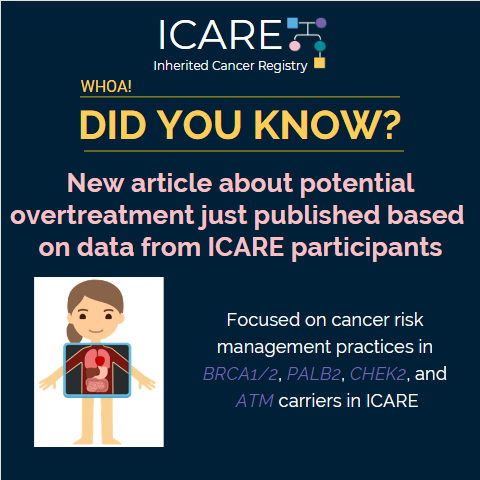 Testing for inherited cancer among breast cancer patients has tremendous potential to guide appropriate care following testing. Yet, a number of efforts suggest that women are not consistently receiving care according to current national guidelines based on their genetic test result. In fact, results from studies suggest many women for whom risk-reducing mastectomy would not be recommended based solely on their genetic test result, may be receiving this procedure. Specifically, high rates of bilateral mastectomy have been reported among those with a BRCA1/2 variant of uncertain significance [1] as well as those with non-BRCA1/2 moderate penetrance genes [2,3], suggesting potential overtreatment. Additionally, a recently published cancer registry-based study suggested that those with a BRCA1/2 mutation may be more likely to receive bilateral mastectomy for a unilateral tumor, less likely to receive post-lumpectomy radiotherapy, and more likely to receive chemotherapy for early-stage, ER/PR-positive disease [2]. Similarly, we have previously reported on risk-reducing oophorectomies conducted among BRCA1/2 carriers, which showed lower rates among Black women compared to non-Hispanic Whites [4]. More recently, our study based directly on ICARE participants, as well as another registry study, suggested there may be potential overtreatment with oophorectomy among women with non-BRCA1/2 inherited breast cancer genes in which oophorectomy is not generally recommended for risk reduction based on current ovarian cancer risk estimates [3,5]. These findings highlight the importance of promoting guideline-adherent care and avoiding overtreatment.6
Testing for inherited cancer among breast cancer patients has tremendous potential to guide appropriate care following testing. Yet, a number of efforts suggest that women are not consistently receiving care according to current national guidelines based on their genetic test result. In fact, results from studies suggest many women for whom risk-reducing mastectomy would not be recommended based solely on their genetic test result, may be receiving this procedure. Specifically, high rates of bilateral mastectomy have been reported among those with a BRCA1/2 variant of uncertain significance [1] as well as those with non-BRCA1/2 moderate penetrance genes [2,3], suggesting potential overtreatment. Additionally, a recently published cancer registry-based study suggested that those with a BRCA1/2 mutation may be more likely to receive bilateral mastectomy for a unilateral tumor, less likely to receive post-lumpectomy radiotherapy, and more likely to receive chemotherapy for early-stage, ER/PR-positive disease [2]. Similarly, we have previously reported on risk-reducing oophorectomies conducted among BRCA1/2 carriers, which showed lower rates among Black women compared to non-Hispanic Whites [4]. More recently, our study based directly on ICARE participants, as well as another registry study, suggested there may be potential overtreatment with oophorectomy among women with non-BRCA1/2 inherited breast cancer genes in which oophorectomy is not generally recommended for risk reduction based on current ovarian cancer risk estimates [3,5]. These findings highlight the importance of promoting guideline-adherent care and avoiding overtreatment.6
[1] Kurian, et al. J Clin Oncol. 2017 Apr. PMID: 28402748; [2] Kurian, et al. JAMA Oncol. 2020 Feb. PMID: 32027353; [3] Cragun, et al. Breast Cancer Res Treat. 2020 Jul. PMID: 32445176; [4] Cragun, et al. Cancer. 2017 Jul. PMID: 28182268; [5] Domchek, et al. J Clin Oncol. 2020 May. Available at: https://tinyurl.com/domchek2020; [6] MyGeneCounsel. 2019 Oct. Available at: https://tinyurl.com/MyGeneCounselWhitePaper
